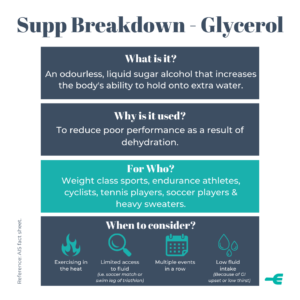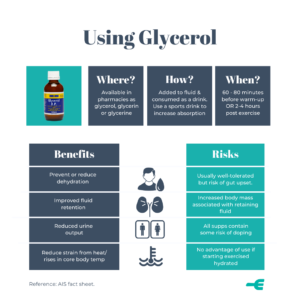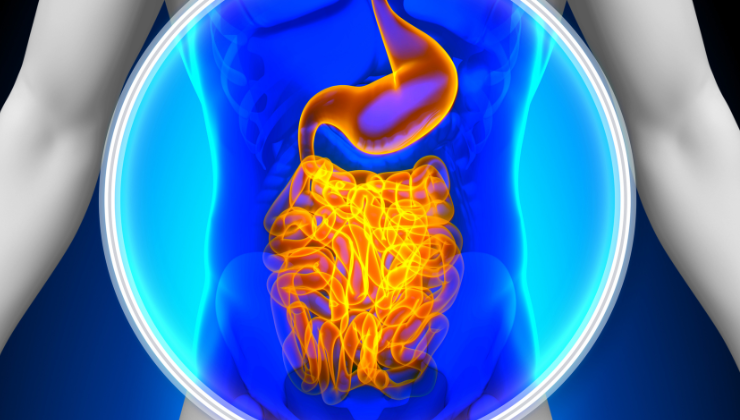Glycerol: The supplement we actually want you to know about!
If you keep an eye on WADA announcements, you would have spotted a change in the banned list from way back in January 1st, 2018. Glycerol had been taken off the banned substance list. It is now a supplement that can be considered for use by all levels of athletes.
So What is Glycerol & Why Was it Previously Banned?
The use of glycerol was previously banned due to it’s ability as a plasma expander and possibility of masking banned substance use. However, recent research has shown that its effects on masking is minimal and so the ban has been lifted.
Glycerol is a molecule that is produced naturally in the body. It is an important component of the cell membrane. It is also used to store fatty acids in the body. Pure glycerol is a sweet-tasting, clear liquid. When mixed with water, it is able to increase the osmolarity (the concentration).
This is where its possibilities for hyperhydration come in. Usually the body likes to keep it’s body water pretty constant. So hydrating beyond a certain point isn’t possible without risking health such as hyponatraemia (low electrolytes) and performance. However, glycerol stimulates water absorption and therefore retains more water. Up to 600mL more than drinking water alone 1,2. It is only when the extra glycerol is removed by the liver and kidneys that the extra water is excreted.
What is the Evidence for Glycerol Like?
More recent research is lacking due to Glycerol being on the banned list – so not so topical when it came to research options. However, new studies are starting to emerge.
Overall, it is important to note that evidence for glycerol use are mixed. Some research shows some pretty hefty improvements in both time to exhaustion and time trials, while others struggle to find any benefit.
What May the Benefits Be?
In the studies that have found a performance benefit, glycerol’s hyperhydration effects assisted in improved heat tolerance (increased sweat rate to cope with heat), delayed dehydration and reduced exercise effort (perceived exertion).
These improvements were shown to then lead to significant improvements in time to exhaustion 3,4,5 and also an improved power output of 3-5% 6,7.
Beyond the endurance setting, glycerol’s hyperhydration properties may also be useful to enhance recovery after a large fluid loss, for example between events or multi-training session days. It may also be highly useful for athletes to re-hydrate following dehydration for weight-making sports between weigh-in and competition. Outside of the competitive athlete market, the use of this supplement could be utilised in other thermally stressful situations in occupational activities such as military operations/training and fire-fighting.
So what does this mean? Hyperhydrating for endurance events in particular, where hydration is challenged or heat regulation hindered, MAY be of benefit by helping you cope in the heat, delay dehydration and actually improve overall performance.
What are the Risks / Side Effects?
As with any supplement, you need to go in knowing the risks. As you consume glycerol with a large amount of water, the expansion of fluid within the body can cause nausea, gastrointestinal distress and headaches. Although rare, it does highlight the need to test the supplement in training first and ensure you spread the intake out over a longer time period to minimise any risk and make sure it suits you.
Also, as you are hydrating and holding more fluid, you will be going into the race heavier – so you need to weigh up the benefits vs. detriment for you individually.
Most importantly in many aspects, there is currently no glycerol product on the market (that I could locate) that is third party batch tested. Although the contamination risk of glycerol is on the lower side, it is not non-existent. So needs to be considered if you are an athlete that gets tested. Clinical grade glycerol is available at pharmacies readily.
There are currently no glycerol products on the market that are third party batch tested.
Proposed Glycerol Intake Protocol
These ranges are based on our comprehensive review of the literature and should be trialled in consultation with a Sports Dietitian to find the dosage that suits you and your performance needs.
The research into using glycerol during and after exercise is extremely limited, so for this reason, the protocol we recommend is for pre-exercise hyperhydration only.
The majority of evidence tends toward consuming 1-1.2g of glycerol per kg of body weight mixed in to a large fluid amount of 25-30mL of water per kg body weight. i.e. if you were 70kg, you would mix 70-85g of glycerol into 1750-2100mL of water.
Some research also suggests that glycerol loading with salt and carbohydrate included can add to it’s benefits 8,9, so you could replace the water with a carbohydrate containing sports drink or consume the glycerol-water drink with your usual pre-race fuelling.
In Summary

Are you wanting to build upon your knowledge of sports supplements? This is just one of the areas we cover in the Compeat Academy courses and a topic that features heavily in our community discussions. Want to learn more?
References:
- Nelson JL, Robergs RA. Exploring the potential ergogenic effects of glycerol hyperhydration. Sports Med 2007;37:981-1000.
- Van Rosendal SP, Coombes JS. Glycerol use in hyperhydration and rehydration: Scientific update. Med Sport Sci 2012;59:104-12.
- Montner P, Stark DM, Riedesel ML, Murata G, Robergs R, Timms M, Chick TW. Pre-exercise glycerol hydration improves cycling endurance time. Int J Sports Med 1996;17:27-33.
- Latzka WA, Sawka MN, Montain SJ, Skrinar GS, Fielding RA, Matott RP, Pandolf KB. Hyperhydration: tolerance and cardiovascular effects during uncompensable exercise-heat stress. J Appl Physiol 1998;84:1858-64.
- Coutts A, Reaburn P, Mummery K, Holmes M. The effect of glycerol hyperhydration on Olympic distance triathlon performance in high ambient temperatures. Int J Sport Nutr Exerc Metab 2002;12:105-19
- Hitchins S, Martin DT, Burke LM, et al. Glycerol hyperhydration improves cycle time trial performance in hot humid conditions. Eur J Appl Physiol 1999;80:494-501.
- Anderson MJ, Cotter JD, Garnham AP, Casley DJ, Febbraio MA. Effect of glycerol-induced hyperhydration on thermoregulation and metabolism during exercise in the heat. Int J Sport Nutr Exerc Metab 2001;11:315-33.
- Goulet EB, De La Flore A, Savoie FA, Gosselin J. Salt + Glycerol-Induced Hyperhydration Enhances Fluid Retention More than Salt- or Glycerol-Induced Hyperhydration. Int J Sport Nutr Exerc Metab 2017; https://doi.org/10.1123/ijsnem.2017-0310
- Goulet ED. Review of the effects of glycerol-containing hyperhydration solutions on gastric emptying and intestinal absorption in humans and in rats. Int J Sports Nutr Exerc Metab 2009;19:547-60.





